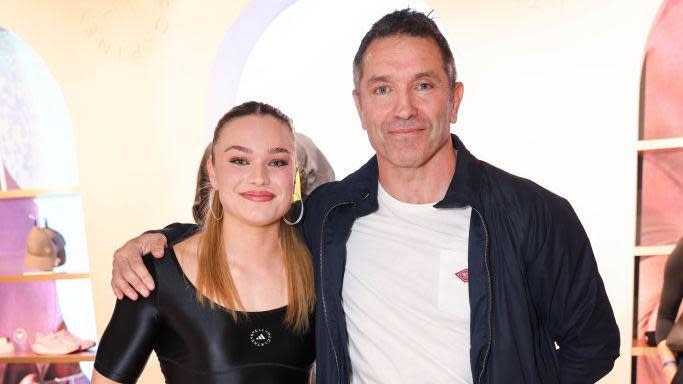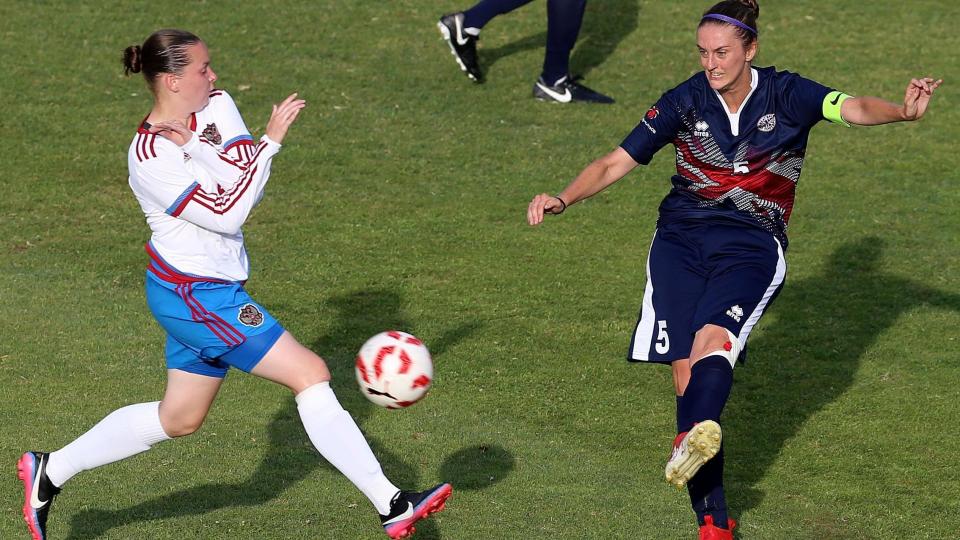'A lot of people don't even know about the lack of exposure and funding'

New plans from Sport England are set to benefit elite Deaf athletes for the first time, but BBC Sport has learned the vast majority will continue to receive no government funding despite pleas from the athletes themselves, their governing body and support from one of the stars of Gladiators.
Former England Rugby Sevens international Jodie Ounsley, also known as Fury in the hit BBC One reboot, is profoundly Deaf but hears via a cochlear implant.
She has given her backing to Deaf athletes' appeal for financial backing while telling her life story to BBC Radio 5 Live documentary The Quiet Place, which will broadcast at 8pm on Wednesday, 21 August.
Deaf athletes compete in the Deaflympics, a competition that takes place every four years and turns 100 years old this summer. It is older than the Paralympics, which has no exclusive categories for Deaf athletes.
In the UK, Paralympic and Olympic athletes benefit from hundreds of millions of pounds of government and National Lottery funding, but elite Deaf athletes receive nothing at all.
Ounsley competed in the 2017 Deaflympics in Turkey in the 100m and she is also the Honorary President of UK Deaf Sport (UKDS).
"I went through school being pretty much the only Deaf person, so the Deaflympics in Turkey really opened up my eyes to a completely new world," she said.
"A lot of people don't even know about it or the lack of exposure and funding. It's just not where it's meant to be at the minute.
"It's something we're trying to do -raise awareness for starters and then any opportunity to get funding would be amazing. It would be special for other people to have the opportunity [to go]."
The 5 Live documentary learned of the existence of the new Sport England plans in which funding will be made available to a small number of sports so they can be inclusive for top Deaf athletes for the first time.
It's not yet known which sports will be involved in the trial, although BBC Sport understands British Cycling and England Golf have held positive meetings with UKDS. Both of those sports are in the Deaflympics programme.
Sport England funds grassroots Deaf sport and their current commitment of £1.27m lasts until 2027.
The trial will be welcomed by some in the Deaf sport community but only as an important first step because the plans will not help the majority of deaf athletes, including those who compete in team sports such as football.
The Great Britain Deaf women's football team only managed to raise the necessary £50,000 to travel to and compete in the World Cup in Malaysia last year, thanks to donations from the likes of Gary Neville, Steven Gerrard, Rangers goalkeeper Jack Butland and comedian Frankie Boyle.
Claire Stancliffe has been at the heart of the fundraising and has played international football for England and GB since 2007, winning a Deaflympic bronze medal.
"Last year I asked Gary Neville to share our story, he said: 'Yeah and I'll also give you £5,000,'" Stancliffe told 5 Live.
"It's so nice to be believed in, but it's embarrassing having to go back and beg people for money again and again.
"We had to watch the 2012 World Cup sitting at home because we couldn't afford to go. It was heartbreaking. If we get to the Deaflympics we'll have to raise £3,000 per player to go, it'll be soul-destroying if we can't."

In June, the US Women's Deaf national team played live on national television in America for the first time. Great Britain were invited to be their opponents but could not afford to make the trip.
GB will qualify for the Tokyo Deaflympics next year if they beat Poland at home in October, but they're fighting to reach a competition they don't know whether they can afford to attend.
The Department for Digital, Culture, Media and Sport (DCMS) makes the ultimate decision on funding before UK Sport then dishes it out.
BBC Sport has learned that DCMS will now engage with Sport England. Officials will also engage with UKDS, who want the government to go much further and fully fund their athletes.
The organisation is asking for £3m to build a competitive team for Tokyo 2025, which will celebrate the centenary of the competition.
"I just hope that the Labour government will hear our plight," said UKDS chairman Nick Brookes.
"They [British Deaf athletes] are competing with fellow athletes who are fully funded by their own countries. The playing field is already uneven before they've even got to the starting block. We have got to change that.
"We don't want to be waiting 30 or 40 years [for funding], we have to accelerate that to one or two years."
A number of nations fully fund their Deaf athletes, including Ukraine whose medal winners were honoured in a reception with President Volodymyr Zelenskyy following the Winter Deaflympics earlier this year, at which they topped the medal table for the first time.
Proud of Ukraine's National Deaflympic Team! At the 20th Winter Deaflympics in Türkiye, our athletes won 19 medals and topped the team ranking for the first time in history.
Ukrainian skiers took first place, winning seven gold, four silver, and two bronze medals. They took the… pic.twitter.com/A8Xy89N3Nn— Volodymyr Zelenskyy / Володимир Зеленський (@ZelenskyyUa) March 13, 2024
Britain’s fastest Deaf swimmer Nathan Young contacted a combination of UK Sport, Sport England, DCMS, the National Lottery and individual sporting governing bodies every day via social media for nearly 1,200 days to appeal for funding.
As a result, the Deaflympic bronze medal winner was blocked by the National Lottery account. The organisation later apologised.
"The point where I started the campaign was when I was the only athlete that ended up going to Brazil for the World Championships," the 20-times British champion said.
"A lot of swimmers couldn't continue with the sport they love because they had to go and get jobs or move further in education.
"Right now I don't wear a single piece of GB kit because I no longer feel like I represent my country, only myself."
A BBC Sport freedom of information request found the idea of bidding to host the Deaflympics was rejected by UK Sport back in 2016 and they have no plans to bid for future competitions. The UK last hosted the Deaflympics in 1935 when they were opened by King George V.
A UK Sport spokesperson said: "We understand the frustration of athletes targeting the Deaflympics, but our remit is specifically focused on investing in sports and athletes who are eligible to compete at the Olympic and Paralympic Games.
"As the Deaflympics falls outside of Olympic and Paralympic sport, we are therefore unable to fund athletes targeting this event. However, it is important to note that where there are Deaf athletes who meet other eligibility criteria that enables them to compete in Olympic and Paralympic sports, then we can and do support them."
The BBC Radio 5 Live documentary, The Quiet Place, will be broadcast at 8pm on Wednesday, 21 August and will then be available to listen to here
The programme is accessible, with a full transcript available here

 Yahoo Sports
Yahoo Sports 
